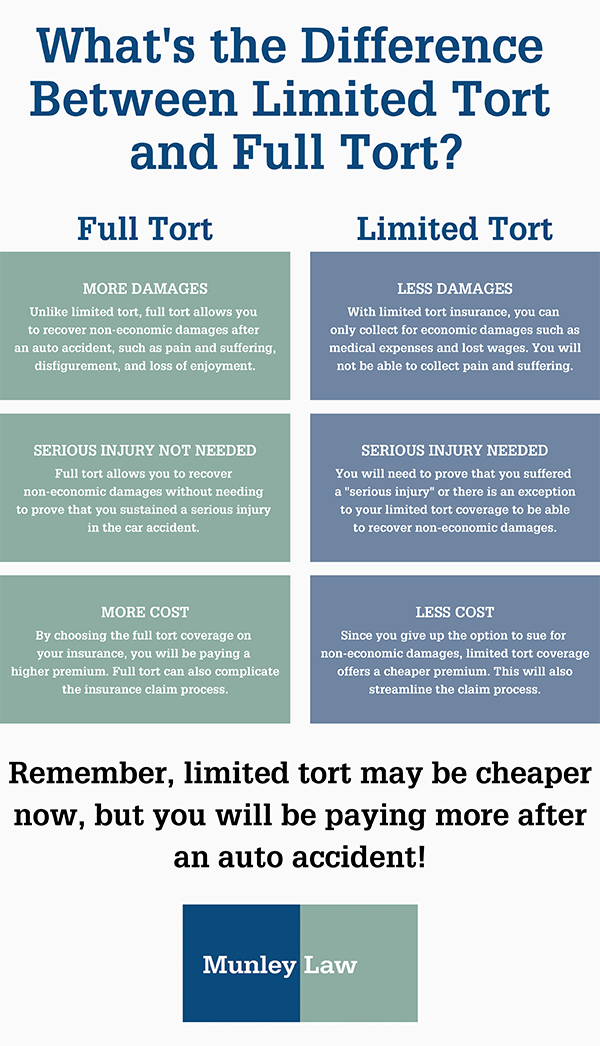Some states, including Pennsylvania, offer two coverage options when choosing car insurance policies: limited tort or full tort coverage. This ensures that a person chooses a policy that best fits their needs. In Pennsylvania, there is limited tort, which restricts the compensation a person can get from a case, and full tort, which puts no restrictions on the compensation.
Knowing the difference between limited tort and full tort coverage is essential when choosing the best fit. If you were involved in a car accident and now have questions about your tort coverage, Munley Law can help. Contact our car accident lawyer today for a free consultation.
Click here to download our free guide on Pennsylvania’s tort coverage.
What Is Pennsylvania’s Tort Insurance?
Pennsylvania’s tort insurance allows the injury victim to be compensated following a car accident. Pennsylvania is a “choice no-fault” insurance state. This means the driver can choose either a no-fault or an at-fault insurance policy. The at-fault policy gives the injury victim the right to sue another driver if that driver caused the car accident. However, a no-fault insurance policy means the injury victim will be compensated by their own insurance company regardless of who is at fault for the accident.
However, the victim’s right to sue the other driver for the accident they caused depends on the type of tort option the injured driver had chosen.
What Is Limited Tort Coverage in Pennsylvania?

According to Pennsylvania Statutes Title 75 PA.CSA Vehicles § 1705, limited tort coverage (as the name suggests) limits the right to seek compensation from the at-fault driver. In Pennsylvania, having limited tort coverage means you can receive compensation from your insurance company, such as medical bills, lost wages, or other out-of-pocket expenses, regardless of whether or not you are at fault for the accident. But you cannot sue the other driver’s insurance for long-term issues, pain, or suffering.
You can only sue for pain and suffering under limited tort if you suffer a “serious injury.” The court system defines serious injuries as the following:
- Loss of a limb
- A permanent disfigurement
- A serious impairment, such as paralysis
- An injury that can prevent you from working for the rest of your life, such as a traumatic brain injury
Other exceptions to the restrictions with limited tort insurance include:
- The driver at fault was under the influence of alcohol or drugs
- The driver’s vehicle is registered out of state
- The driver intended to hurt the victim
- The driver does not have insurance
It is important to note that limited tort coverage must be requested in Pennsylvania. If you don’t explicitly ask for limited tort coverage, you will be automatically given full tort until you request to change to a limited tort option.
What Is Full Tort in Pennsylvania?
Pennsylvania law states that full tort coverage gives the injury victim an unrestricted right to seek compensation for injuries from the at-fault driver. Full tort coverage allows you to sue for medical expenses, lost wages, property damage, and non-economic damages, more commonly known as pain and suffering.
For example, if you have post-traumatic stress disorder (PTSD) and you are no longer able to drive your vehicle, if you have full tort, you would be able to sue the at-fault driver for your PTSD and the changes it has made in your life. However, you couldn’t sue for damages if you had limited tort.
What Are the Pros and Cons of Tort Coverage?

Limited Tort Pro: Less Expensive
Since full tort gives unlimited access, it will understandably be more expensive. Your premium payments will be approximately 15 percent more than you would pay for limited tort. If you are on a budget and have trouble making a larger payment for your car insurance, limited tort coverage is the way to go.
Limited Tort Con: Can Be Too Restrictive
 Limited tort only allows you to sue for a handful of issues, usually only monetary. This means that if complications arise in the future, you can do nothing. For instance, you discover that you’ve developed an injury that prohibits you from doing some everyday tasks after your accident. Since you have limited tort coverage, you cannot bring a lawsuit to pay any future medical expenses. This alone can make limited tort coverage the wrong choice for some.
Limited tort only allows you to sue for a handful of issues, usually only monetary. This means that if complications arise in the future, you can do nothing. For instance, you discover that you’ve developed an injury that prohibits you from doing some everyday tasks after your accident. Since you have limited tort coverage, you cannot bring a lawsuit to pay any future medical expenses. This alone can make limited tort coverage the wrong choice for some.
Car accidents can cause serious and long-term damage, and the restrictions of limited tort coverage can be too much of a risk. Saving more money in the present is not worth losing out on compensation later, especially in the case of big accidents.
Full Tort Pro: No Restrictions
Since there are no restrictions on full tort coverage, you can sue for non-monetary issues. The most prominent example is that you can sue for pain and suffering with full tort coverage.
For example, if you get in a car accident that results in back pain or other kinds of long-term damage, full tort coverage allows you to sue the other driver for these damages. This fact makes full tort coverage a better choice than limited tort for some because the option to sue for pain and suffering or other non-monetary issues is a choice they want to be able to make if they ever have an accident.
Full Tort Con: The Cost
The cost of full tort coverage is higher than limited tort coverage. This is because of how many more options full tort coverage gives. For some, the price may outweigh the benefits. You may not consider potential car accidents or think full tort coverage is needed when getting your insurance policy. Or you may not want to spend that extra money. So, if you do not want to pay more on your monthly premium or do not think the benefits full tort coverage gives are necessary, then this may not be the coverage for you.
Now I Know the Difference. Which One Should I Get?
The answer is by no means black and white. Insurance policies are different for everyone. It is very important to review each policy’s pros and cons and decide which best fits your needs before deciding. If you want to save money and are okay with taking the risk of the restrictions, choose limited tort. However, if you have the funds and want to ensure you can get full compensation if you are ever in an accident, go with full tort.
Choosing carefully when hiring a car accident lawyer ensures your case is successfully heard. Munley Law has been helping people nationwide with their cases for over 65 years, and we pride ourselves on being there for you when you need it most. Our experienced team of attorneys works hard to invest in your case and get you the help you need. Whether you have limited or full tort coverage, we will help you and your case. Contact our Pennsylvania car accident lawyer today for a free consultation.
Frequently Asked Questions About Full Vs. Limited Tort in Pennsylvania Car Accidents
I have limited tort insurance, but a manufacturing defect caused my car accident. Do I have a claim?
Yes, you may still have a claim. If a vehicle defect or malfunction caused your injuries, you can pursue a product liability lawsuit against the manufacturer. Limited tort does not restrict claims against third parties like manufacturers.
Call Munley Law to learn your legal options.
How does underinsured or uninsured motorist coverage factor into my tort coverage?
UM/UIM coverage can compensate if the at-fault driver has no insurance or too little coverage. Your tort selection (full or limited) still applies, but exceptions—like if the at-fault driver is uninsured—may allow limited tort policyholders to recover full damages.
Can I switch from limited to full tort?
Yes, but only during policy renewal or when starting a new auto insurance policy. You can contact your insurer to make the switch. The change won’t apply retroactively, so switching before an accident happens is best.
How does full or limited tort affect a car accident lawsuit in PA?
Full tort lets you sue for all damages, including pain and suffering. Limited tort generally restricts you to economic damages only (like medical bills), unless your injury is severe or an exception applies. Your tort choice directly impacts your legal options in a lawsuit.
How do I determine if I have full tort or limited tort coverage?
Check your insurance declarations page—look for a section titled “Tort Option.” It will state whether you selected full tort or limited tort. You can also call your insurance agent for confirmation. Reviewing this annually is a smart way to stay informed.









